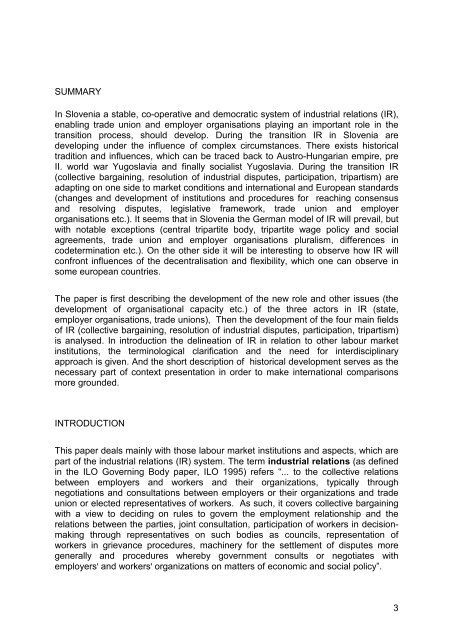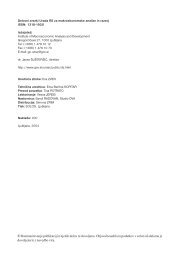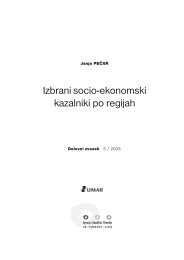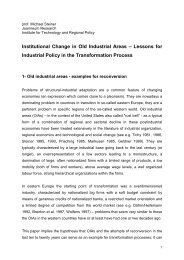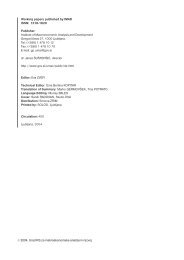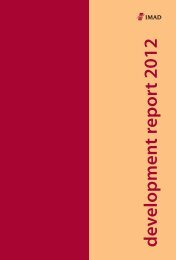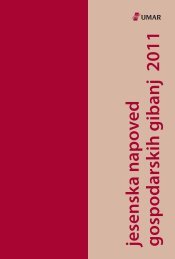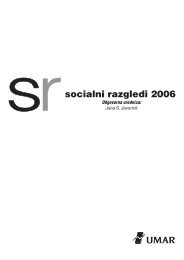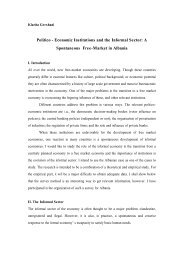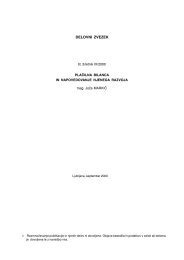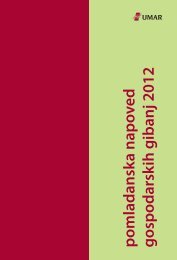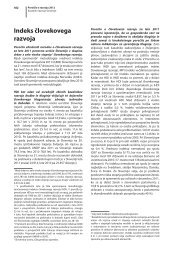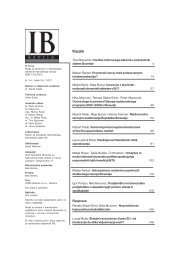The Development of New Industrial Relations in Slovenia - UMAR
The Development of New Industrial Relations in Slovenia - UMAR
The Development of New Industrial Relations in Slovenia - UMAR
You also want an ePaper? Increase the reach of your titles
YUMPU automatically turns print PDFs into web optimized ePapers that Google loves.
SUMMARY<br />
In <strong>Slovenia</strong> a stable, co-operative and democratic system <strong>of</strong> <strong>in</strong>dustrial relations (IR),<br />
enabl<strong>in</strong>g trade union and employer organisations play<strong>in</strong>g an important role <strong>in</strong> the<br />
transition process, should develop. Dur<strong>in</strong>g the transition IR <strong>in</strong> <strong>Slovenia</strong> are<br />
develop<strong>in</strong>g under the <strong>in</strong>fluence <strong>of</strong> complex circumstances. <strong>The</strong>re exists historical<br />
tradition and <strong>in</strong>fluences, which can be traced back to Austro-Hungarian empire, pre<br />
II. world war Yugoslavia and f<strong>in</strong>ally socialist Yugoslavia. Dur<strong>in</strong>g the transition IR<br />
(collective barga<strong>in</strong><strong>in</strong>g, resolution <strong>of</strong> <strong>in</strong>dustrial disputes, participation, tripartism) are<br />
adapt<strong>in</strong>g on one side to market conditions and <strong>in</strong>ternational and European standards<br />
(changes and development <strong>of</strong> <strong>in</strong>stitutions and procedures for reach<strong>in</strong>g consensus<br />
and resolv<strong>in</strong>g disputes, legislative framework, trade union and employer<br />
organisations etc.). It seems that <strong>in</strong> <strong>Slovenia</strong> the German model <strong>of</strong> IR will prevail, but<br />
with notable exceptions (central tripartite body, tripartite wage policy and social<br />
agreements, trade union and employer organisations pluralism, differences <strong>in</strong><br />
codeterm<strong>in</strong>ation etc.). On the other side it will be <strong>in</strong>terest<strong>in</strong>g to observe how IR will<br />
confront <strong>in</strong>fluences <strong>of</strong> the decentralisation and flexibility, which one can observe <strong>in</strong><br />
some european countries.<br />
<strong>The</strong> paper is first describ<strong>in</strong>g the development <strong>of</strong> the new role and other issues (the<br />
development <strong>of</strong> organisational capacity etc.) <strong>of</strong> the three actors <strong>in</strong> IR (state,<br />
employer organisations, trade unions), <strong>The</strong>n the development <strong>of</strong> the four ma<strong>in</strong> fields<br />
<strong>of</strong> IR (collective barga<strong>in</strong><strong>in</strong>g, resolution <strong>of</strong> <strong>in</strong>dustrial disputes, participation, tripartism)<br />
is analysed. In <strong>in</strong>troduction the del<strong>in</strong>eation <strong>of</strong> IR <strong>in</strong> relation to other labour market<br />
<strong>in</strong>stitutions, the term<strong>in</strong>ological clarification and the need for <strong>in</strong>terdiscipl<strong>in</strong>ary<br />
approach is given. And the short description <strong>of</strong> historical development serves as the<br />
necessary part <strong>of</strong> context presentation <strong>in</strong> order to make <strong>in</strong>ternational comparisons<br />
more grounded.<br />
INTRODUCTION<br />
This paper deals ma<strong>in</strong>ly with those labour market <strong>in</strong>stitutions and aspects, which are<br />
part <strong>of</strong> the <strong>in</strong>dustrial relations (IR) system. <strong>The</strong> term <strong>in</strong>dustrial relations (as def<strong>in</strong>ed<br />
<strong>in</strong> the ILO Govern<strong>in</strong>g Body paper, ILO 1995) refers “... to the collective relations<br />
between employers and workers and their organizations, typically through<br />
negotiations and consultations between employers or their organizations and trade<br />
union or elected representatives <strong>of</strong> workers. As such, it covers collective barga<strong>in</strong><strong>in</strong>g<br />
with a view to decid<strong>in</strong>g on rules to govern the employment relationship and the<br />
relations between the parties, jo<strong>in</strong>t consultation, participation <strong>of</strong> workers <strong>in</strong> decisionmak<strong>in</strong>g<br />
through representatives on such bodies as councils, representation <strong>of</strong><br />
workers <strong>in</strong> grievance procedures, mach<strong>in</strong>ery for the settlement <strong>of</strong> disputes more<br />
generally and procedures whereby government consults or negotiates with<br />
employers' and workers' organizations on matters <strong>of</strong> economic and social policy”.<br />
3


